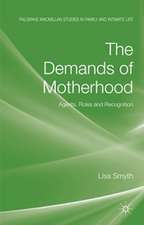Wives Without Husbands: Marriage, Desertion, and Welfare in New York, 1900-1935: Gender and American Culture
Autor Anna R. Igraen Limba Engleză Paperback – 31 dec 2006
Igra taps a rich trove of case files from the National Desertion Bureau, a Jewish husband-location agency, and follows hundreds of deserted women through the welfare and legal systems of early twentieth-century New York City. She integrates a broad range of topics, including Americanization as a gendered process, breadwinning as a measure of manhood, the relationship between consumer culture and social policy formation, the class dimensions of family law, and the Jewish community as a source of welfare policy innovation. Igra analyzes the history of antidesertion reform from its emergence in social policy debates, through the establishment of domestic relations courts, to Depression relief programs. She shows that early twentieth-century reformers, by attempting to make instrumental use of poor people's intimate relations, anticipated welfare policies in our own time that promote marriage as an answer to poverty.
Din seria Gender and American Culture
-
 Preț: 212.39 lei
Preț: 212.39 lei -
 Preț: 233.15 lei
Preț: 233.15 lei -
 Preț: 218.16 lei
Preț: 218.16 lei -
 Preț: 304.42 lei
Preț: 304.42 lei -
 Preț: 310.02 lei
Preț: 310.02 lei -
 Preț: 307.89 lei
Preț: 307.89 lei -
 Preț: 303.66 lei
Preț: 303.66 lei -
 Preț: 298.04 lei
Preț: 298.04 lei -
 Preț: 234.89 lei
Preț: 234.89 lei -
 Preț: 229.49 lei
Preț: 229.49 lei -
 Preț: 232.97 lei
Preț: 232.97 lei -
 Preț: 280.80 lei
Preț: 280.80 lei -
 Preț: 272.12 lei
Preț: 272.12 lei -
 Preț: 265.21 lei
Preț: 265.21 lei -
 Preț: 228.34 lei
Preț: 228.34 lei -
 Preț: 322.33 lei
Preț: 322.33 lei -
 Preț: 346.27 lei
Preț: 346.27 lei -
 Preț: 334.73 lei
Preț: 334.73 lei -
 Preț: 303.05 lei
Preț: 303.05 lei -
 Preț: 305.00 lei
Preț: 305.00 lei -
 Preț: 303.27 lei
Preț: 303.27 lei -
 Preț: 307.68 lei
Preț: 307.68 lei - 5%
 Preț: 257.64 lei
Preț: 257.64 lei -
 Preț: 304.42 lei
Preț: 304.42 lei -
 Preț: 314.04 lei
Preț: 314.04 lei -
 Preț: 309.80 lei
Preț: 309.80 lei -
 Preț: 229.88 lei
Preț: 229.88 lei -
 Preț: 267.33 lei
Preț: 267.33 lei -
 Preț: 274.07 lei
Preț: 274.07 lei -
 Preț: 259.81 lei
Preț: 259.81 lei -
 Preț: 305.57 lei
Preț: 305.57 lei -
 Preț: 312.52 lei
Preț: 312.52 lei -
 Preț: 311.33 lei
Preț: 311.33 lei -
 Preț: 461.45 lei
Preț: 461.45 lei -
 Preț: 363.26 lei
Preț: 363.26 lei -
 Preț: 266.74 lei
Preț: 266.74 lei -
 Preț: 234.71 lei
Preț: 234.71 lei -
 Preț: 333.59 lei
Preț: 333.59 lei -
 Preț: 244.40 lei
Preț: 244.40 lei -
 Preț: 231.24 lei
Preț: 231.24 lei -
 Preț: 303.05 lei
Preț: 303.05 lei - 23%
 Preț: 562.19 lei
Preț: 562.19 lei -
 Preț: 216.22 lei
Preț: 216.22 lei -
 Preț: 182.07 lei
Preț: 182.07 lei -
 Preț: 220.45 lei
Preț: 220.45 lei -

Preț: 259.81 lei
Nou
Puncte Express: 390
Preț estimativ în valută:
49.71€ • 51.91$ • 41.15£
49.71€ • 51.91$ • 41.15£
Carte tipărită la comandă
Livrare economică 04-18 aprilie
Preluare comenzi: 021 569.72.76
Specificații
ISBN-13: 9780807857793
ISBN-10: 0807857793
Pagini: 175
Dimensiuni: 147 x 234 x 11 mm
Greutate: 0.25 kg
Editura: University of North Carolina Press
Seriile Gender and American Culture, Gender and American Culture (Paperback)
ISBN-10: 0807857793
Pagini: 175
Dimensiuni: 147 x 234 x 11 mm
Greutate: 0.25 kg
Editura: University of North Carolina Press
Seriile Gender and American Culture, Gender and American Culture (Paperback)
Textul de pe ultima copertă
Igra traces the efforts of Progressive reformers in New York City to make "runaway husbands" support their families. Investigating the interrelated histories of marriage and welfare policy in the early 1900s, she reveals how reformers sought to make marriage the solution to women's and children's poverty. She integrates a broad range of topics, including Americanization as a gendered process, breadwinning as a measure of manhood, the relationship between consumer culture and social policy formation, the class dimensions of family law, and the Jewish community as a source of welfare policy innovation. Igra analyzes the history of anti-desertion reform from its emergence in social policy debates, through the establishment of domestic relations courts, to Depression relief programs. Igra traces the efforts of Progressive reformers in New York City to make "runaway husbands" support their families. Investigating the interrelated histories of marriage and welfare policy in the early 1900s, she reveals how reformers sought to make marriage the solution to women's and children's poverty. She integrates a broad range of topics, including Americanization as a gendered process, breadwinning as a measure of manhood, the relationship between consumer culture and social policy formation, the class dimensions of family law, and the Jewish community as a source of welfare policy innovation. Igra analyzes the history of anti-desertion reform from its emergence in social policy debates, through the establishment of domestic relations courts, to Depression relief programs.
Notă biografică
Anna R. Igra is associate professor of history and director of the Women's and Gender Studies Program at Carleton College.
















